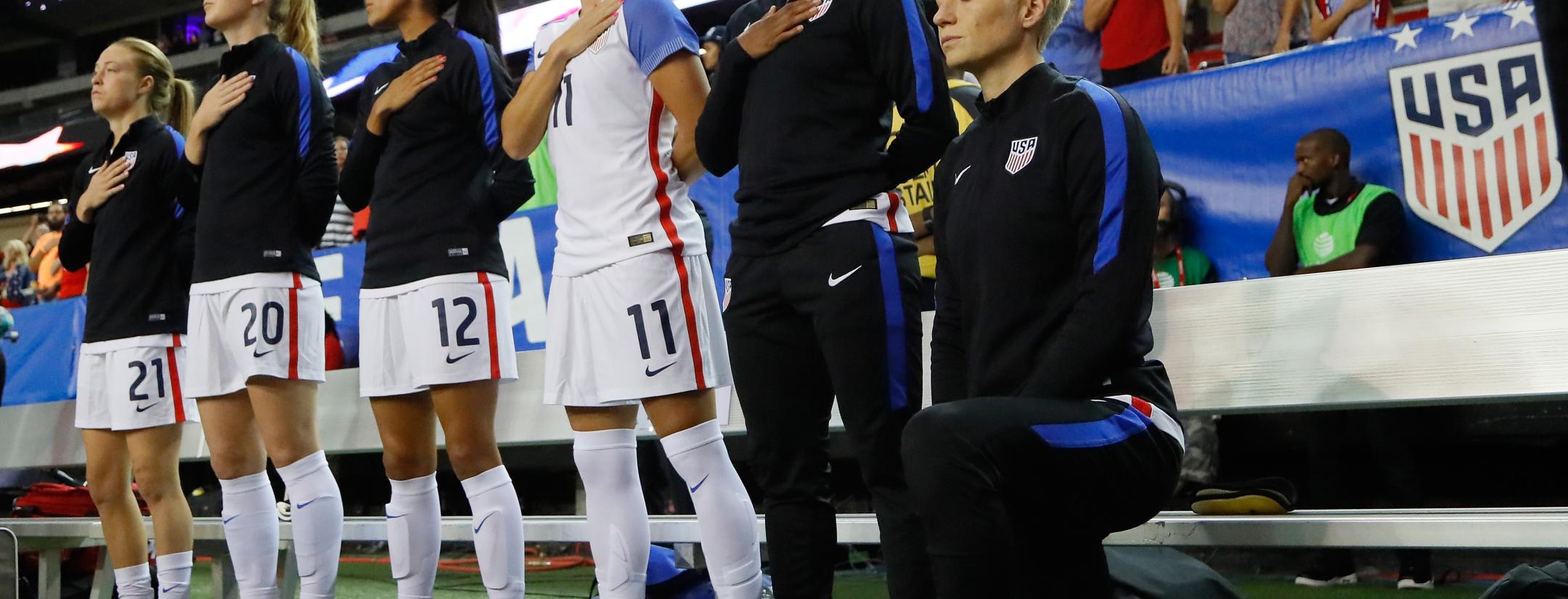Four years later, U.S. Soccer admitted it was wrong and said it’s sorry.
The U.S. Soccer Federation released a statement on Wednesday evening saying its board of directors had voted to repeal Policy 604-1, which was put in place to prevent national team players from kneeling during the national anthem before a match.
The U.S. Soccer Board of Directors voted yesterday to repeal Policy 604-1, which required our players to stand during the national anthem.
Black Lives Matter.
We can do more and we will. pic.twitter.com/wtyfkVZmsB— U.S. Soccer (@ussoccer) June 11, 2020
The repeal is a complete 180 from where U.S. Soccer was in 2016. That year, Megan Rapinoe became the first athlete outside of the NFL to take a knee to protest police brutality and systemic racism in America, following the lead of NFL quarterback Colin Kaepernick. Rapinoe created waves kneeling for her NWSL club the Seattle Reign and did so before friendlies against Thailand and the Netherlands.
Four years ago, white people apparently weren’t ready to listen to black people telling them about the horrific atrocities committed against them every day by people in positions of power. U.S. Soccer quickly instituted Policy 604-1, which essentially said if you don’t stand for the anthem, you can’t play. Those in power at U.S. Soccer were more interested in protecting their dollars than allowing players to peacefully protest. Similar responses were made in the NFL and other leagues. One NWSL owner played the national anthem before players on either team could take the field to ensure Rapinoe didn’t kneel during the song.
Following the slaying of George Floyd, views have changed. Floyd’s murder has sparked weeks of protests and some in positions of power have started to listen, even in the sports world.
The protests have helped illuminate not just the necessity of protesting, a Constitutional right, but the sanctity of protesting peacefully. Taking a knee during an anthem isn’t spitting on the grave of those who have died for the country, it’s honoring those who have fought for our freedoms by upholding the ideals on which this country was founded. While people are free to disagree with how they go about it, by denying them the right to protest you’re silencing their right to free speech. Without protests — many of them less than peaceful — we wouldn’t have women voting, black people voting, five-day work weeks and countless more voters’ and workers’ rights. Unless you want to work seven days per week, you can’t say you’re against protests of any kind.
In response to these demonstrations, players in the Bundesliga have taken knees or worn Black Lives Matter warm-up shirts to support the protests. The NFL, which led the world in silencing its black athletes, said on Friday it did not handle the situation properly (while not even mentioning Kaepernick). NASCAR finally decided to ban Confederate flags from races. (I’ve seen folks applaud the move on social media, but any company that has to institute a ban on such obvious hate symbols in 2020 does not deserve praise.)
On Monday, USWNT players put out a statement asking the Federation to repeal the anthem policy.
USWNT Player's statment re: @ussoccer's "Anthem Policy" pic.twitter.com/Jd4OtRDhRJ
— USWNT Players (@USWNTPlayers) June 9, 2020
Reportedly at the urging of new USSF president Cindy Parlow Cone, the board met Tuesday to discuss the policy ahead of the board’s scheduled Friday meeting. A bit late but better late than never, U.S. Soccer finally reversed course on its anthem policy on Wednesday. In its statement, U.S. Soccer admitted it was wrong, affirmed Black Lives Matter, apologized and sought to do better to listen to its players and staff, especially those of color.
“U.S. Soccer affirms Black Lives Matter, and we support the fight against racial injustices.
“The U.S. Soccer Board of Directors voted yesterday afternoon to repeal Policy 604-1, which required our players to stand during the national anthem. The policy was put in place after Megan Rapinoe kneeled in solidarity with the peaceful protest inspired by Colin Kaepernick, who was protesting police brutality and the systematic oppression of Black people and people of color in America. It has become clear that this policy was wrong and detracted from the important message of Black Lives Matter.
“We have not done enough to listen — especially to our players — to understand and acknowledge the very real and meaningful experiences of Black and other minority communities in our country. We apologize to our players — especially our Black players — staff, fans, and all who support eradicating racism. Sports are a powerful platform for good, and we have not used our platform as effectively as we should have. We can do more on these specific issues and we will.
“It should be, and will be going forward, up to players to determine how they can best use their platforms to fight all forms of racism, discrimination, and inequality. We are here for our players and are ready to support them in elevating their efforts to achieve social justice. We cannot change the past, but we can make a difference in the future. We are committed to this change effort, and we will be implementing supporting actions in the near future.”
While it probably should have been repealed sooner — or not been implemented at all — I can appreciate the USSF admitting it was wrong and did not do enough, something that can be difficult for people in power. That said, there’s still much to be done within the U.S. soccer system.
Soccer in America has long been a sport of the white and privileged, where money is more important than skill and opportunity. Until the pay-to-play model is either abolished or at the very least limited to inconsequential leagues, inequality in soccer will continue to be rampant in this country.
But change is coming, and there is finally an appetite for it.
Michelle Akers, the legendary USWNT star, posted on Thursday about the anthem policy, saying she initially didn’t agree with Rapinoe’s decision to kneel. She, like many other Americans, are coming to recognize how necessary these protests are to bring about change that is so badly needed in this country rampant with white supremacy and police violence.
Akers isn’t alone. People are changing. Hopefully it’s lasting, meaningful change.




